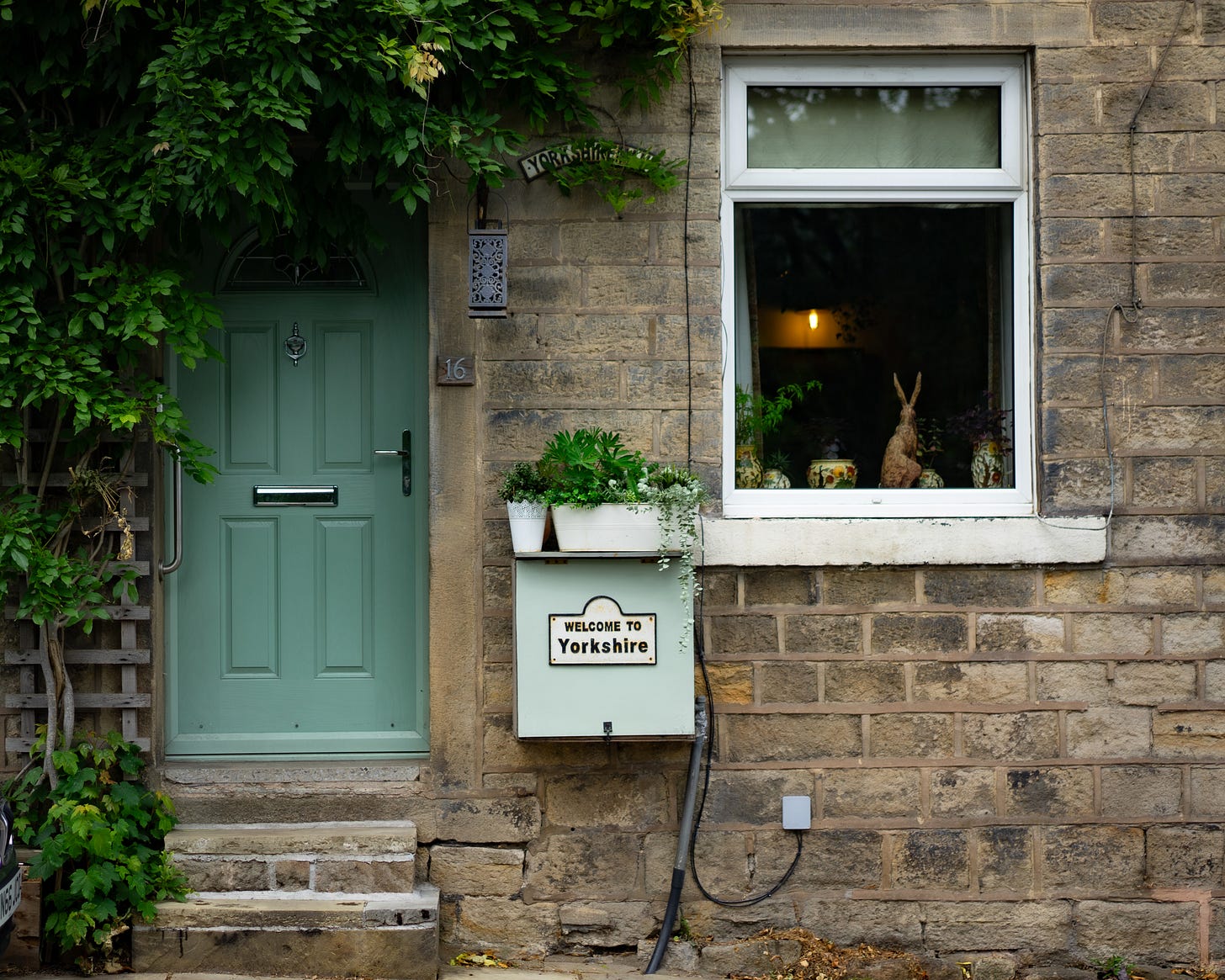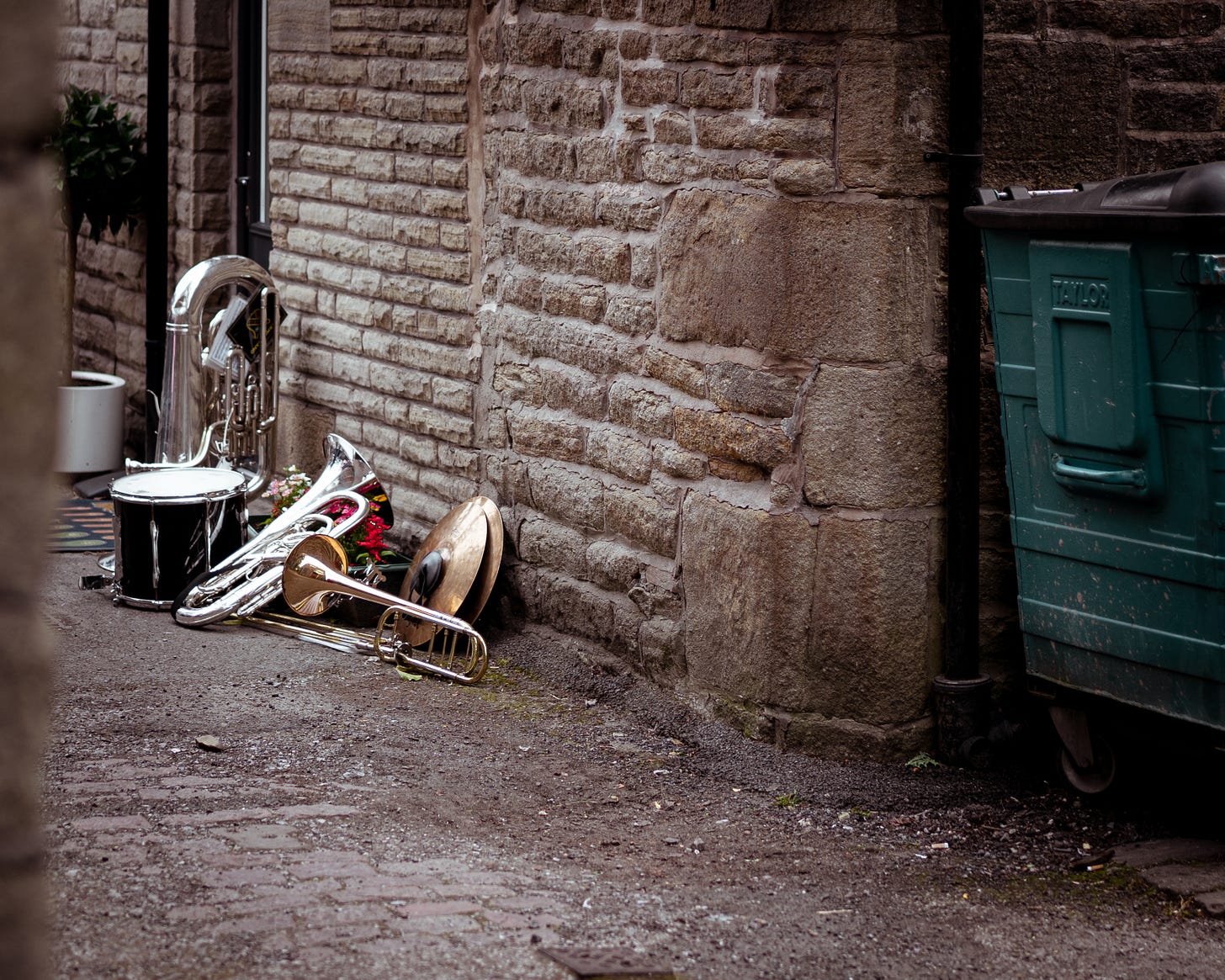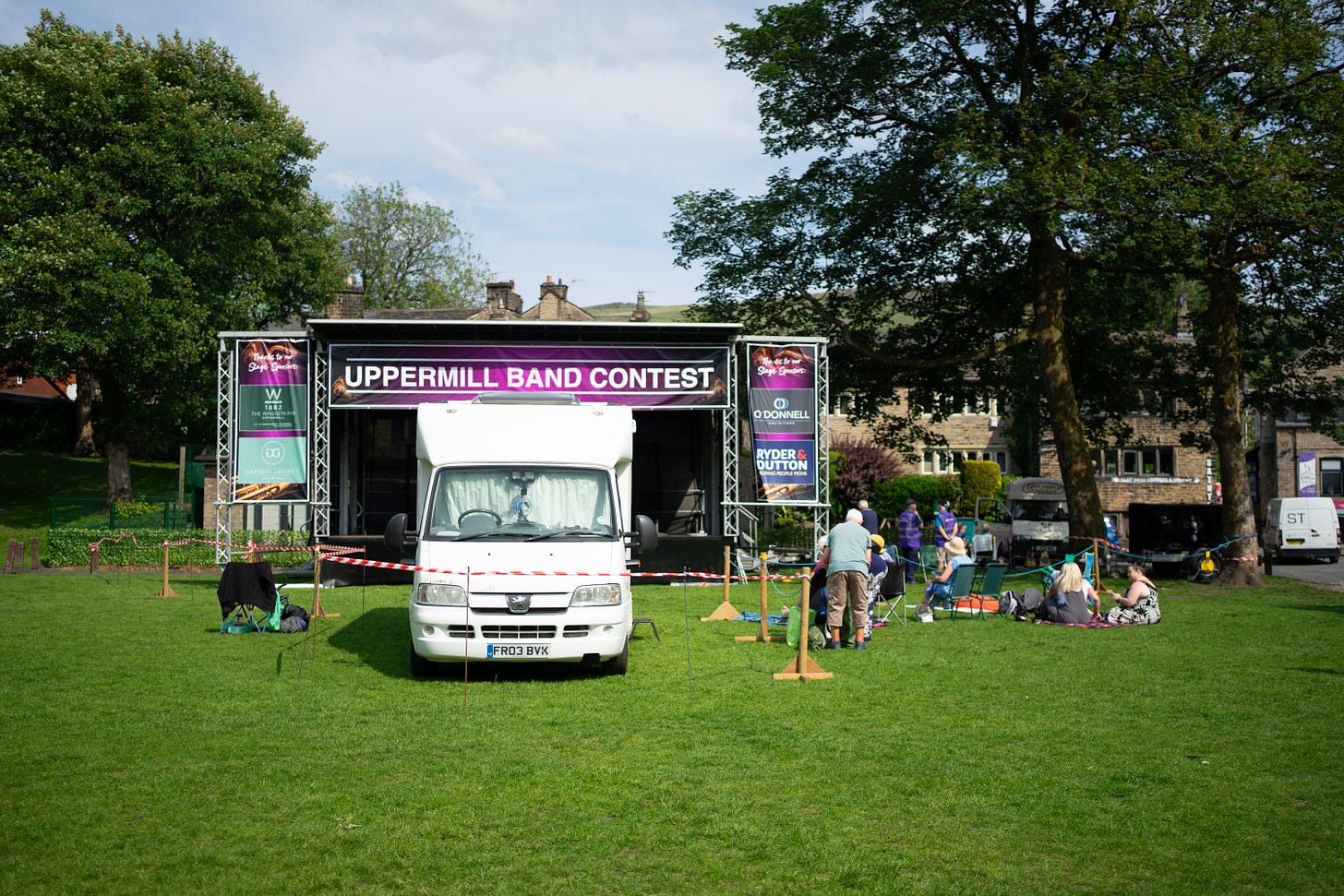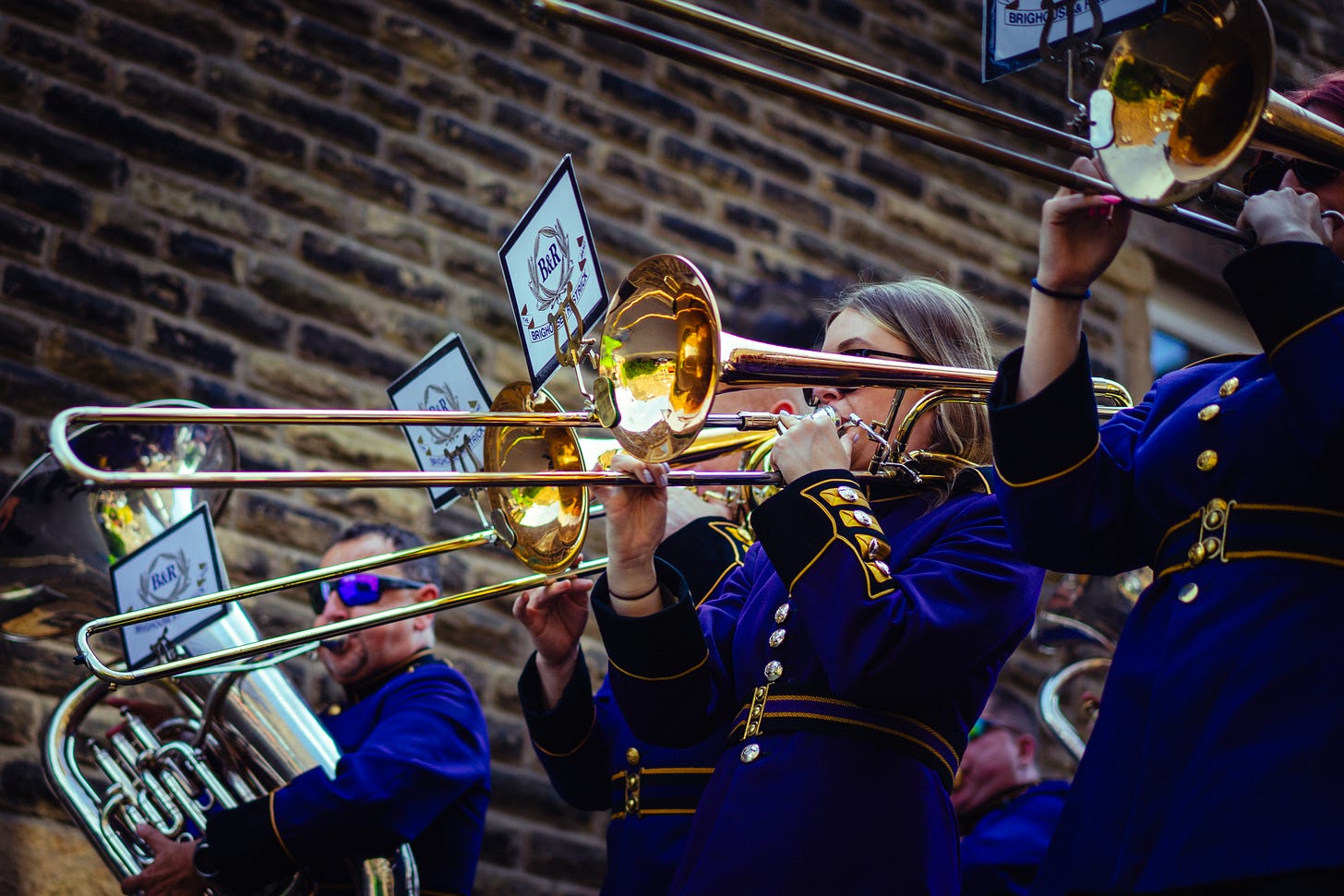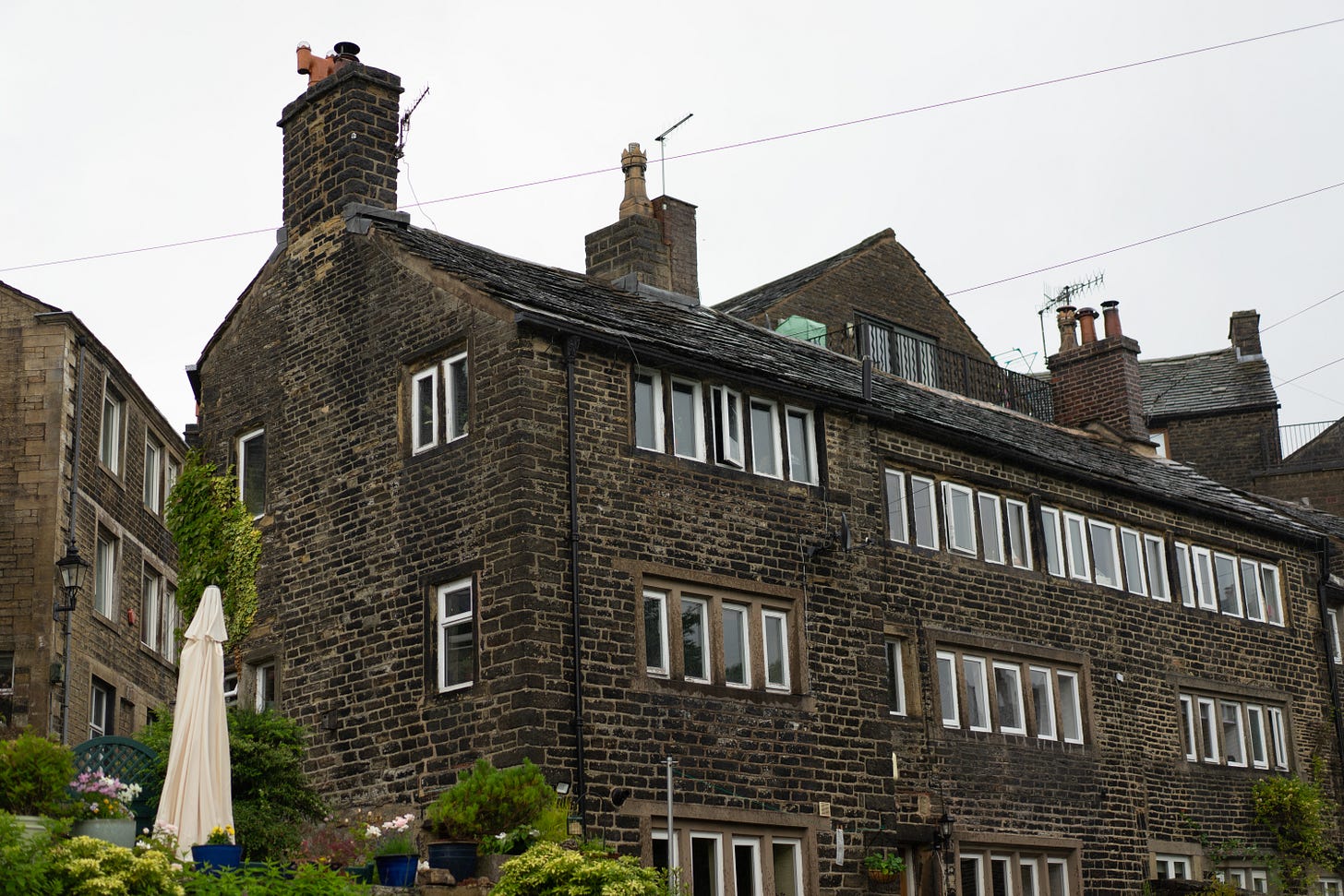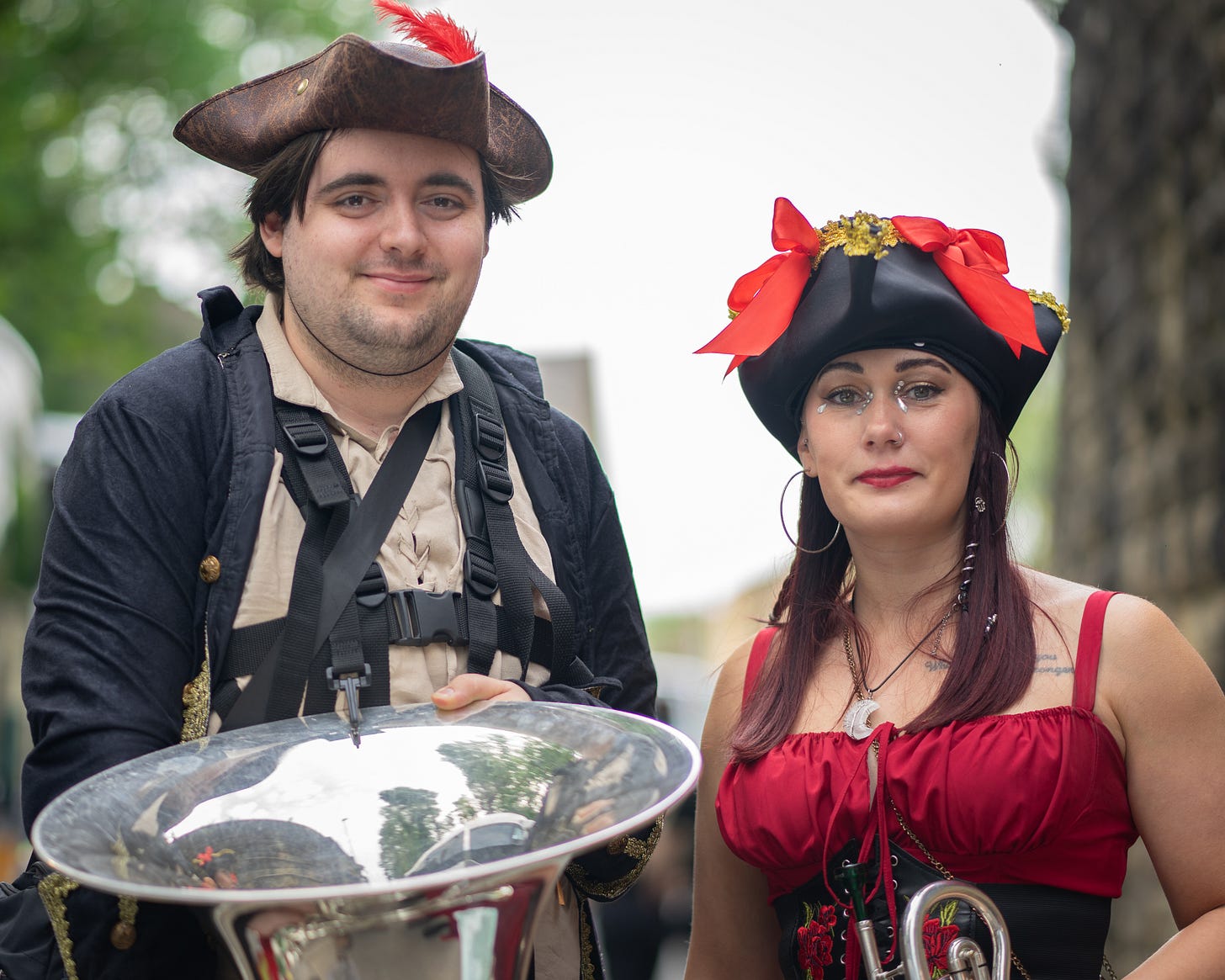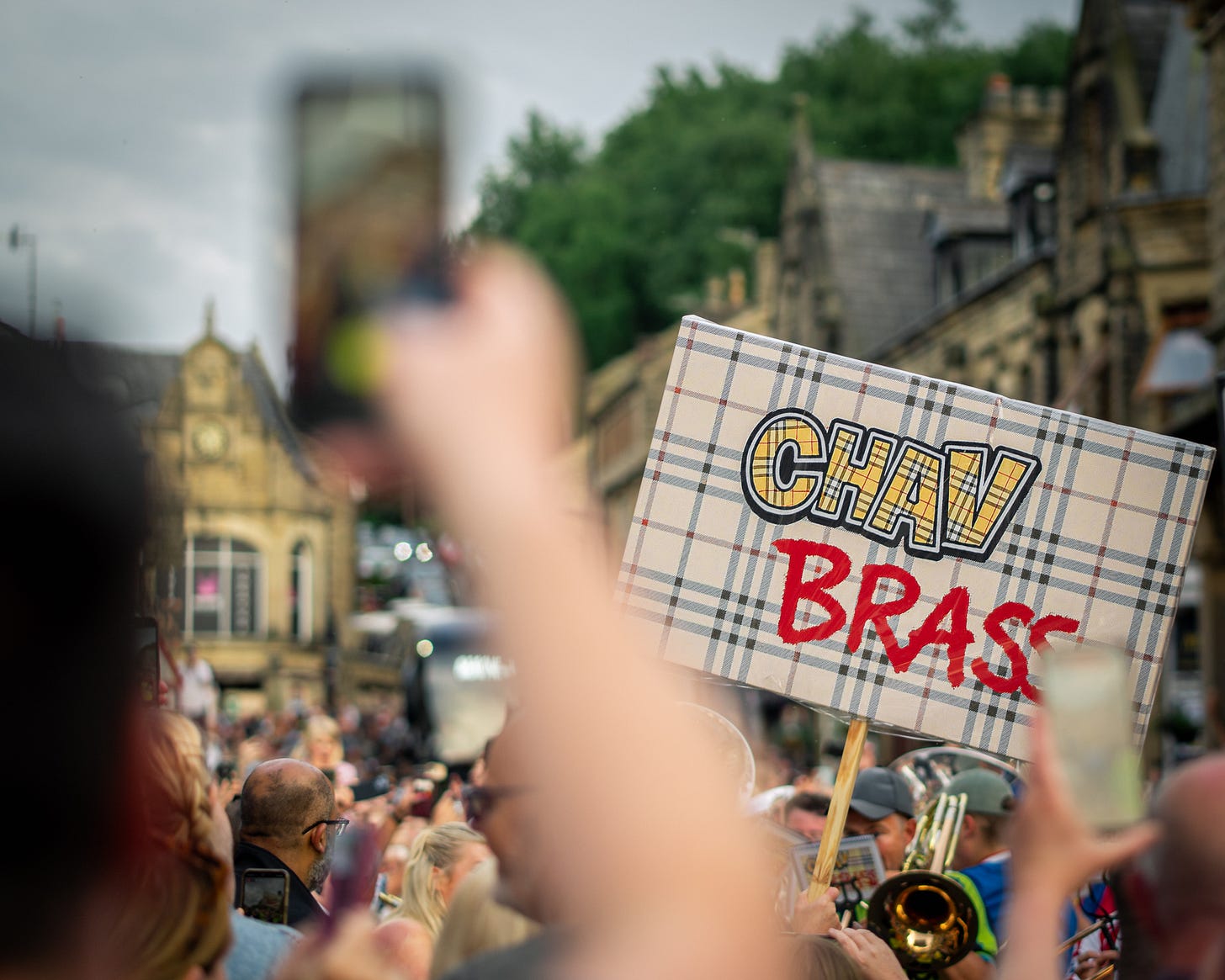I woke up at my parents' house on Friday the 13th June to the news that Israel had bombed Iran. My dad and I watched the coverage briefly and did the usual sort of despairing chat that ordinary people do in the face of horrifying seismic global events.
Then we turned the TV off, because it was time to go to the Whit Marches, often called the ‘Greatest Free* Show on Earth’ where bands from across the country, and farther afield race around the picturesque villages of Saddleworth, West Yorkshire to compete in brass band contests in front of crowds of locals, brass band enthusiasts and tourists.
Katy and I arrived at Greenfield train station with very little plan, so we followed other passengers from the train along the road to Uppermill. It felt like arriving in a different time and place, a million miles away from the horrors on the news, in cosy Wallace and Gromit Yorkshire, where the streets are paved with Hovis Advert Cobbles and the bricks are blackened by soot from mills long since closed. This is not the Yorkshire I grew up in, high end boutiques and expensive cars suggest an affluence likely the result of how close the villages are to Manchester; however, this is the Yorkshire of the popular imagination. An appropriate setting for a major Brass Band event.
When we arrived an open-air church service was taking place on the green. A decent sized congregation joined in with a prayer as others stood around chatting, there were intricate cloth banners propped up against stone walls alongside upturned tubas.
On Whit Friday morning, before the contests, local brass bands and churches march through Uppermill, with banners and children and scouts. Katy took some photos, and we walked along following the parade. The event felt inclusive, and as someone who lives in Scotland, I couldn’t help but observe the vast difference between this and marches that take place in Glasgow in the name of Protestantism.
It was all very wholesome, apart from the drinking, which had already started when we arrived at 11:30. Katy and I decided that we should, perhaps, have a couple of half pints at the Hare and Hounds, and we sat and watched as the village prepared for the crowds that would descend later. The sun was shining as pub proprietors rolled kegs of beer across the road to set up makeshift outdoor bars. One young band in black short sleeve shirts made a beeline for a beer, and I overheard their young female band leader say, ‘isn’t it a bit early’.
I was in no position to judge whether it was too early, by this point I was two pints deep.
The contests and marches start at 4pm, but by midday Uppermill was already filling with people. By 3:30pm coaches had arrived, and we spotted a few bands, including Brighouse and Rastrick warming up underneath a tree on a square at the entrance to the village. One of Yorkshire’s ‘top bands’, Brighouse and Rastrick were being followed by a film crew from Channel Five, which made us wonder if perhaps Brass Bands are ‘having a moment’, finding their way back into the cultural zeitgeist after a long period in the wilderness.
Brass banding does seem to be getting some attention from the outside world- Martin Green made an excellent podcast for Radio 4, which he followed up with an album and Keli, a National Theatre of Scotland production. Black Dyke was recently profiled in the Guardian; Radio Three launched a Brass Band Show with Hannah Peel and Sam Fender recorded ‘Remember my Name’ with Easington Colliery band as part of his most recent album.
When the contests were about to start, we decided to walk to Dobcross, a small village rumoured to be one of the more picturesque places to watch the Marches. We crossed the river behind the playing field carefully traversing slippery stepping stones with camera equipment in tow.
It wasn’t hard to find Dobcross; there were signs everywhere directing band coaches and spectators to each village, as well as road closures and men in high vis keeping everything running smoothly.
Dobcross is hilly, with winding cobbled streets, picture perfect gardens and a small village green in the centre, where the bands play under trees decked out in fairy lights. When we arrived, the green was completely packed. It’s incredible that this space can fit this many spectators, let alone the coaches dropping the bands off.
Before the contests began, bands marched down the hill round the corner, so we found a spot in someone's front garden and waited. The first band we saw played a fun brass version of Madonna’s Like a Prayer; as the bands march, they play to please the crowds, before they go play their contest piece to please the adjudicators.
After watching a few bands march, I found a spot on the grass to watch the contest. The green was full of people with folding chairs, plastic pints and paper plate pizza. I looked around to try and work out where the judges might be hiding. Eventually I spotted a wide-open window on the top floor of one of the old houses, and I realised they must be in there.
This made me wonder about who lives in that house. Were they banders? Did they mind providing space for the brass band adjudicator? What would happen if the property were ever sold to new owners?
New to market – Three bed historic terraced property, south facing, retaining many period features including the requirement that you give up the back bedroom once a year to a young man called Derek who will sit there marking brass bands from around 4pm to midnight’.
We stayed in Dobcross for a few hours, band spotting. One of the fun parts of the marches for the enthusiast is that you never know what band is going to turn up. It could be a youth band, one of the top bands in the country or a fun novelty act like the Huddersfield pirates or the infamous Chav Brass.
As we left Dobcross a youth band with players who looked as young as 8 or 9 arrived, which was undeniably heartwarming. This was one of the few bands I saw who were not entirely white, something I have started to notice about brass banding after speaking with Ade a few weeks ago. The crowds and the bands were all very white, which stands out to me, because it is so very different to the area of inner-city Glasgow where I live and work. An area I feel at home in, despite looking and sounding different to other people.
I feel at home here too, but then, I look and sound like everyone else. I wonder if I would feel as welcome if I didn’t. I hope that I would, but that question is ultimately impossible for me to answer.
After Dobcross we headed to Delph, which I had been told was the best village for atmosphere. It did not disappoint. Delph is a bigger village with a proper high street and by the time we got there around 6/7pm the Marches were one huge street party.
Coaches lined the edge of the village and bands lingered around waiting to March which presented the ideal opportunity to get a few portraits.
Revellers lined the streets waiting for the bands to march, and around the corner the contests took place in front of an old Methodist church. There was a clear division between the lively street party and the more formal contests taking place around the corner in front of an older, seated audience.
The contest was being compered by Bob Rodgers, who hosted the bands with deadpan wit. After every band he repeated ‘you’ve been to the best village now, it’s all downhill from here’ in an accent I identified as being ‘a bit more Lancashire’.
We bumped into Bob the next morning and Katy was able to get a few portrait shots. He told us proudly that he was the Halifax adjudicator in Brassed Off and immediately gave us his one line ‘And the winners are, with 194 points, Grimley Colliery Band’. Bob told us he wasn’t really into the bands like Chav Brass who muck about because they ‘**** up the schedule’ but he admitted that they do bring in money for the street collections.
Chav Brass were a band we were keen to see, they are a fixture of the Whit Marches, a scratch band usually made up of students from the Royal Northern College of Music and other ringers. I would usually refrain from using the word, chav. When I was a student at an elite university I recoiled at ‘chav’ being used as fancy dress as it seemed akin to class-based blackface. This felt different and I am not sure why. Perhaps it is because Brass Banding is the original working class or ‘chav’ music, so it doesn’t seem like appropriation, more reclaiming the word? Maybe I have chilled out a bit because with all that is going on in the world, this hardly seems to matter.
When Chav Brass finally arrive, decked out in fake gold and Burberry and tracksuits, wearing red caps that say ‘make brass chav again’ the crowd goes wild. They play Freed from Desire and everyone in the audience is either dancing or filming it on their phones or both. Chav Brass were so much fun that it was impossible to be a humourless leftist in their presence.
We finished the day in Denshaw, where the contest was much smaller, and took place in front of a community pub, where we managed to get a couple of hotdogs and shelter from the rain that had made a last-minute appearance. The contests go on until midnight, and the bands try to play as many as possible to win points and prize money. We stayed till the bitter end, and it was worth it as we managed to catch both Hepworth and Black Dyke play in Denshaw under the fairy lights,with pints in our hands. It was kind of magical.
Standing around in front of the pub it was easy to chat to people, I found myself in a conversation with a man whose daughter was in one of the bands. He told me immediately that he was a communist and asked me if I knew much about the origins of the brass banding movement.
Socialism, industrial history and brass bands, hold my beer! I have thoughts about this!
We talked a bit about politics, and how the bands were founded as means of controlling the workers and keeping them out of the pub, whilst at the same time functioning as a source of solidarity and community. Brass bands are claimed by the right and the left, it’s complicated. It was an interesting discussion, with no easy conclusions available at 11:45pm in the rain in Denshaw.
At midnight an Army band played the national anthem, and the day ended. The sight of the military provided an unwelcome reminder of the real world that the contests felt like a complete escape from. My day had started and ended with discouraging discussions about the current state of affairs globally, but in the middle, there was the Whit Marches, a completely separate, sacred space where nothing really matters except coming together to make music.
*I love the emphasis on ‘Free’, it seems particularly Northern to me to point out that as well as showcasing high quality musicianship, this spectacle is excellent value.



